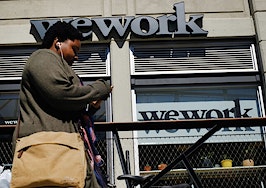When Warburg Realty president and venture capitalist Clelia Warburg Peters said she studied real estate tech at cocktail parties, people’s eyes used to glaze over.
“Now I’d say at least 50 percent of the time they’ve heard something about it or read something about it and want to engage with me,” said Peters, a founding partner at Metaprop, a New York City-based real estate technology incubator and funder.
Her phone is ringing off the hook from venture capitalists circling the space, she said.

Clelia Warburg Peters | Credit: Warburg Realty
Meanwhile, people familiar with the thinking of SoftBank’s Vision Fund, a mega tech investor based in Japan, say it’s very pleased with the performance of two of its prized real estate possessions: iBuyer Opendoor and tech-focused brokerage Compass.
And the behemoth investor has committed to raising up to an additional $100 billion for a second Vision Fund — a chunk of which will likely go to funding real estate tech firms.
But that may be easier said than done: a recent report by The Wall Street Journal suggests that SoftBank Corp. CEO Masayoshi Son and his cadre are having a much harder time raising money from investors this go-around.
Nonetheless, Son told the newspaper in early May that SoftBank was dedicated to launching a second fund, even if it has do so all by itself without initial commitments from other investors.
SoftBank declined to comment on the extent to which a second Vision Fund might target the real estate sector. But an operating partner at the original Vision Fund has previously said the original fund’s real estate investments would likely reflect or exceed the industry’s share of GDP — which he put at around 17 percent.
If the same logic applied to a second Vision Fund, at least an additional $17 billion would be ripe for the taking by real estate tech firms.
In mid-May, the original Vision Fund still had $20 billion more to deploy, according to CNBC. It made a number of investments last month, though. And The Journal recently reported that almost all the fund’s capital has been spent. Some of what’s left could still flow into real estate startups, though.
The Vision Fund’s conviction in its real estate bets remains intact, according to a person familiar with its thinking. By the fund’s estimation, it’s still early innings for industry disruption, the person said.
“SoftBank is in an interesting position, where they really become almost kingmakers and they’re able to fund people in a way where they can operate outside of concerns related to profitability for a long time,” Peters said.
The Vision Fund is one of the largest, if not the largest, shareholder in Compass and Opendoor.
In two separate funding rounds, it’s poured $850 million into Compass, most recently valued by its investors at $4.4 billion. And after investing $400 million in Opendoor in September, the Vision Fund expanded its ownership stake in the iBuyer in yet another funding round announced by Opendoor in March, according to the person familiar with SoftBank’s thinking.
These follow-on investments in both Compass and Opendoor demonstrated its commitment to the two firms. The Vision Fund believes both firms are performing “phenomenally,” according to the person familiar with SoftBank’s thinking.
The disappointing initial public offering of Uber may have signaled growing investor scrutiny of firms with long and uncertain roads to profitability. But Peters says she hasn’t seen any of the fallout affect real estate industry.
That said, she pointed out that Uber and Compass do resemble each other in some respects.
“I don’t think either of them have meaningfully proven that they’re moving towards profitability,” she said. “It will be interesting to see … how much leeway investors will give them.”

Williston Financial Group CEO Patrick Stone | Credit: Kyle Espeleta/Inman
Compass, she added, isn’t “anywhere near delivering” its stated goal of providing a novel and improved end-to-end tech experience of homebuyers and sellers.
However, even if the startup were to shutter, it has made a lasting impact on the industry. Compass has focused much more attention on “increasing professionalization for more support for agent branding and marketing,” she said. And it has stirred the imaginations of investors. They’re now captivated by the dream of using technology to vacuum up huge amounts of money thrown off by the world’s largest asset class.
For its part, the Vision Fund is mostly focused on growth for now. But it does see a clear path to profitability for both Opendoor and Compass, according to Inman’s sources with knowledge of the company’s thinking.
Despite having expanded into new markets, Opendoor’s total listing count is down from around 3,600 in January to roughly 2,600 today, according to Zillow data. But this doesn’t concern SoftBank. It chalks the drop up to seasonability, according to Inman’s source.
SoftBank views Zillow Group’s increased pivot towards bolstering its Homes division and associated iBuyer business Zillow Offers, meanwhile, as a validation of Opendoor — not an existential threat.
Zillow’s popular listing portal may offer its iBuyer a big marketing edge over Opendoor. But Opendoor has a huge head start on Zillow, our source said, noting that it’s painstakingly built a vast operational infrastructure and honed its technology for years.
Particularly encouraging for SoftBank has been Opendoor’s success with packing title and mortgage services into its core home-sale business. Both could serve as important sources of revenue that would allow the iBuyer to further reduce the cost of its main sale offering, thereby attracting more customers. “Attach rates” between its customers and those ancilliary services have been quite promising, the person said.

Mike DelPrete | Credit: Adventures In Real Estate
Some industry experts think real estate tech investors are heading for a cliff, though. Patrick Stone, founder of title insurer Williston Financial Group, recently told Inman that this is the fourth time he’s seen a “stupid” amount of money flood the sector from “people who don’t even understand the industry.”
“Hello, we’ve seen this movie!” he said. “I look at this, and I just shake my head.”
Michael Delprete, a real estate tech consultant, thinks the space is ripe for innovation, but he also shares some of this skepticism.
“I get the sense many investors think they understand the industry, but don’t know what they don’t know, and think that deep pockets and technology — whatever that means these days — can solve all problems,” he said.
The failure of Purplebricks’ push to popularize low-fee brokerage in the U.S. may be an early warning sign. But the brokerage was using a business model that has failed many times before.
Compass and Opendoor, on the other hand, are using other business models and have been armed with about 10 times as much firepower, noted Delprete, who is also a scholar-in-residence at the University of Colorado Boulder.
If nothing else, Delprete said, the investor stampede means agents will face more questions about their value and about new options for buying and selling homes.
“You’re going to have consumers starting to ask the question: “Why are you charging me this? Do you do instant sales?”













